15 Biggest Robotics Companies in the World
In this article, we are going to list the 15 biggest robotics companies in the world. Click to skip ahead and jump to the 5 biggest robotics companies in the world. Today, robots are becoming more powerful and faster in computing and processing command and applications which are powered by artificial intelligence and machine learning. A robot is defined as a programmable mechanical device that can perform tasks and interact with its environment, without the aid of human interaction.
Robots are programmed to perform the jobs humans won't do - the most boring, most dangerous, and the dirtiest jobs you can think of. Robots indeed impact our lives as some are designed and built to do tasks that are too complex for us humans. Yet people are scared because these robots will replace their jobs? Normal feeling but still we're the ones to bring them to life and we'll sure be the one to end it for them in case it gets uncontrollable.
There's a wide variety of robots and I might bore you out talking about them here but there are 6 types of robots I can share with you: industrial, domestic, military, medical, service, and security robots. Industrial robots are automated machines working in the manufacturing sector and they can perform welding, assembly, and painting. Next, we have your favorite sophisticated dust eater a.k.a your robotic vacuum is called a domestic robot. On the other hand, we have military robots who can perform military tasks that are too risky for humans such as bomb disposal. Military robots are also programmed to do rescue and search. FLIR Systems (NASDAQ: FLIR) is a tech company that develops programs that enhances imaging and threat detection. FLIR produces combat-ready robots that help bomb techs and SWAT operators in responding to daily missions. Next, we have medical robots like Mako by Stryker (NYSE: SYK), a tech-centered company listed as one of the 15 biggest medical devices companies in the world. Mako allows surgeons to have a more predictable surgical experience when performing joint replacement surgery. On the other hand, we have service or concierge robots mostly seen in the hospitality industry. One of the biggest tech giants in the world, IBM (NYSE: IBM), developed a robot concierge named Connie for Hilton Mclean. Lastly, security robots are roaming at some malls, power plants, chemical storage facilities, and even residential developments. Aside from being able to provide surveillance 24/7, security robots are programmed to perceive adverse weather conditions and even gas leaks!
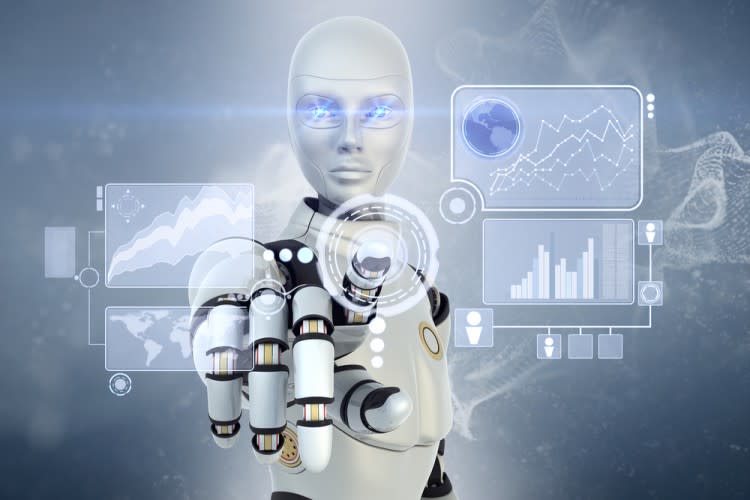
Tatiana Shepeleva/Shutterstock.com
In 2020, the global robotics market was valued at $76.6 billion and is projected to reach $176.8 billion in 2025 with a compound annual growth rate of approximately 18.2%. The automotive industry is one of the key drivers for the demand for robots specifically in the industrial sector. Robots are really no strangers to the automotive industry, as they are one of the most highly automated supply chains in the world. General Motors (NYSE: GM) was a pioneer in the use of robotic systems in the car manufacturing sector back in 1961. GM is one of the 12 autonomous vehicle stocks to buy for 2021.
The outbreak of COVID-19 has become a global stress test. In general, the robotics industry experienced a slowdown in production in 2019 and 2020 due to certain industries halting their operations during quarantine such as automotive, metal, and machinery. This is due to the implemented lockdowns by the government to stop the spread of the virus globally. The good news is, many hospitals are already deploying robots to help fight COVID-19 not only in the US but also in Italy, Tunisia, and India. In March 2020, China opened a hospital staffed by robots in the epicenter of coronavirus, Wuhan.
Indeed, robotics have made our lives easier and help us in fighting the pandemic we are into today. To give you the most accurate list of the biggest robotics companies, we looked up the latest annual financial statement of these robotics companies and researched the revenue, market cap, assets, and the number of employees each company has in our list and ranked them from the smallest to largest values. Let's take a look at the biggest robotics companies in the world starting at number 15:
15. iRobot (NASDAQ: IRBT)
Revenue: $1.3 billion
Market Cap: $2.23 billion
Assets:
Number of employees: 528
Headquarters: Bedford, Massachusetts
iRobot Corporation is specializing in designing and production of consumer robot. The company's portfolio of robotics solutions includes various innovations for smart homes and various concepts in visualization, navigation, mobility, and artificial intelligence.
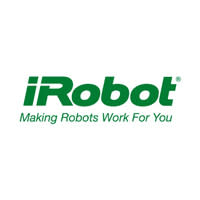

14. Zebra Technologies (NASDAQ: ZBRA)
Revenue: $3.8 billion
Market Cap: $21.05 billion
Assets: $1.9 billion
Number of employees: 8,200
Headquarters: Lincolnshire, Illinois
One of the biggest robotics companies in the world, Zebra Technologies offers a retail robot called SmartSight. This automated system optimizes the customer's retail experience and boosts overall store performance by solving the most common problems we encounter in a retail store such as out of stock products, incorrect pricing, and high labor costs. Zebra Technologies also distributes barcode technology, RFID readers, mobile computers, and printers that capture real-time data.
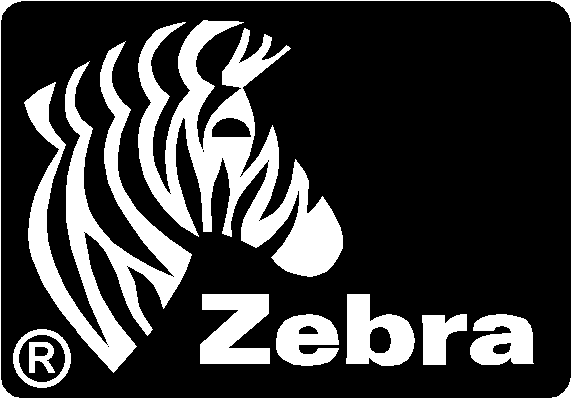
13. Yaskawa Electric (YASKY)
Revenue: $4.3 billion
Market Cap: $8.2 billion
Number of employees: 15,179
Headquarters: Kitakyushu, Fukuoka, Japan
Yaskawa Electric is one of the largest makers of AC inverters, motors, and industrial robots. The company operates in sectors of robotics, information technology, system engineering, and motion control. The robotics sector accounts for 37% of Yaskawa's revenue in 2020. The company's robotics supplies vertically articulated robots as key products that contribute to the automation of welding, painting, and assembly at manufacturing sites in the automotive markets and in various fields.
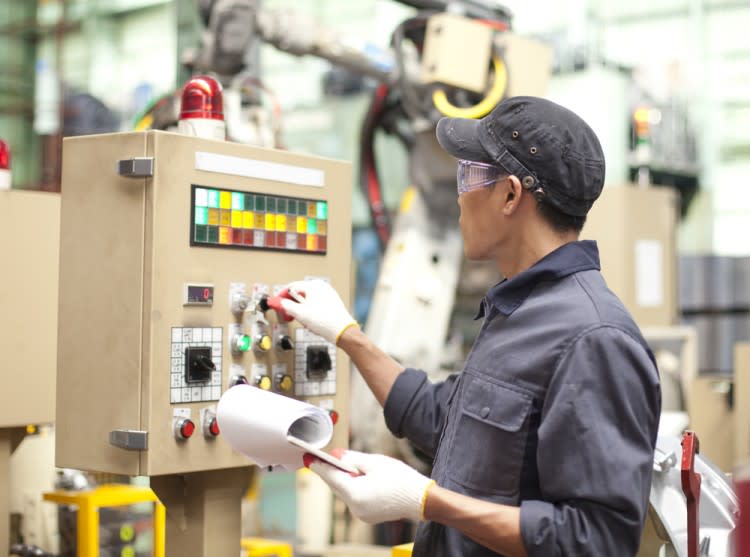
ndoeljindoel/Shutterstock.com
12. Intuitive Surgical (NASDAQ: ISRG)
Revenue: $4.6 billion
Market Cap: $93.2 billion
Assets: $9.9 billion
Number of employees: 7,326
Headquarters: Sunnyvale, California
Intuitive is the developer and manufacturer of the Da Vinci surgical system. This system helps allow your surgeon to perform minimally invasive surgery with an advanced set of instruments and a 3D high-definition view of the surgical area. Since its launch in 1999, Da Vinci provided more than 6 million robot-assisted surgeries worldwide.

Master Video/Shutterstock.com
11. Fanuc Corp
Revenue: $4.7 billion
Market Cap: $32 billion
Assets: $14 billion
Number of employees: 7,866
Headquarters: Oshino-mura, Yamanashi Prefecture, Japan
Fanuc Corporation is a Japanese manufacturing company primarily engaged in the supply of factory automation, robot, and robot machine. The company offers products of the CNC series, servo motors, lasers, robotic systems, compact machining centers, electric injection molding machines, wire-cut electrical discharge machines, and ultra-precision machines.
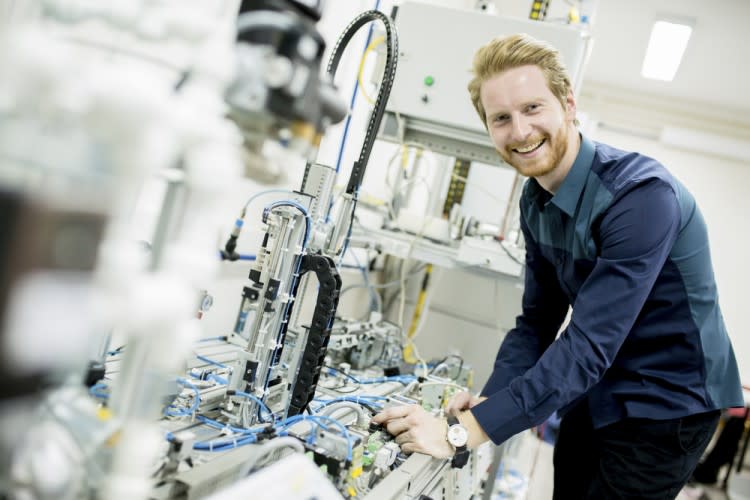
Goran Bogicevic/Shutterstock.com
10. Rockwell Automation (NYSE: ROK)
Revenue: $6.8 billion
Market Cap: $30.04 billion
Assets: $6.7 billion
Number of employees: 23,000
Headquarters: Milwaukee, Wisconsin
Rockwell Automation is one of the largest providers of industrial automation power, control, and information solutions for manufacturing companies globally. The company is also engaged in manufacturing products such as systems, motor control equipment, sensors, and industrial control panels.

9. KION Group
Revenue: $9.7 billion
Market Cap: $5.9 billion
Assets: $15.5 billion
Number of employees: 34,604
Headquarters: Frankfurt, Germany
The KION Group is one of the global leaders in the field of industrial trucks, warehouse technology, related services, and supply chain solutions. One of KION Group's innovative solutions is developing smart facilities with revolutionary automotive solutions. In 2020, the KION group partnered with Quicktron in developing an autonomous mobile robot.
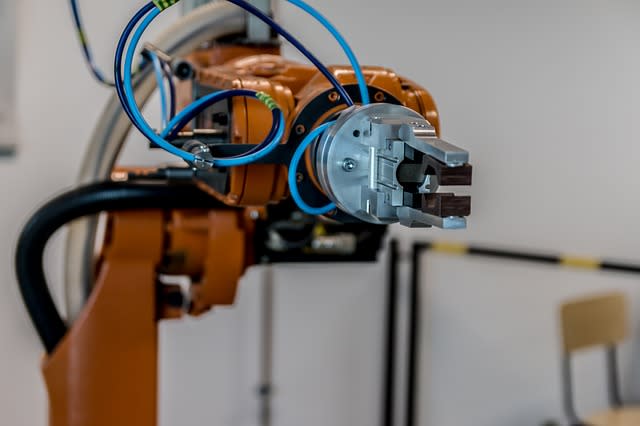
8. Seiko Epson
Revenue: $9.9 billion
Market Cap: $5.6 billion
Assets: $9.4
Number of employees: 75,608
Headquarters: Suwa, Japan
Seiko Epson Corporation is a Japanese company engaged in the business of printing solutions, visual communication, and wearable and industrial products. Epson may be popular for their printing solutions but their robotics sector is also thriving. Epson is engaged in the design and construction of industrial robots for factory automation.
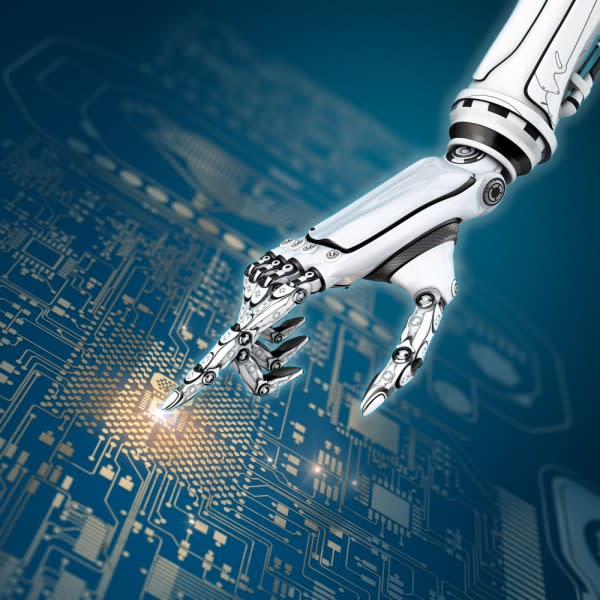
Willyam Bradberry/Shutterstock.com
7. Yamaha Motor
Revenue: $15.3 billion
Market Cap: $4.6 billion
Assets: $14.1 billion
Number of employees: 55,255
Headquarters: Iwata, Japan
Yamaha Motor Co., Ltd. is specializing in the design and sale of motorcycles, automotive engines, and transport equipment. Yamaha was founded in 1955 and in 1981, Yamaha Motor launched the industrial robot division of the company. Since then, Yamaha Motor supplies industrial robotics products and machines globally such as articulated robots, SCARA robots, cartesian robots, clean robots, and pick and place robots.
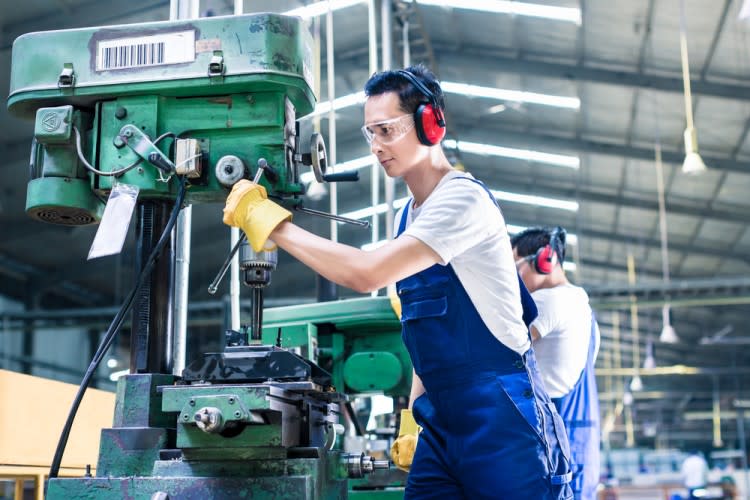
Kzenon/Shutterstock.com
6. ABB (NYSE: ABB)
Revenue: $28 billion
Market Cap: $401.62 million
Assets: $46.1 billion
Number of employees: 144,400
Headquarters: Zurich, Switzerland
ABB is a leading multinational tech company that drives the transformation of society and industry to a more productive, sustainable future by connecting software to its portfolio of electrification, robotics, automation, and motion. ABB manufactures and sells robotics and machine automation solutions, including robots, controllers, software, function packages, cells, programmable logic controllers, industrial PCs, and collaborative robot solutions.
Click to continue reading and see the 5 biggest robotics companies in the world. Suggested Articles:
Disclosure: None. 15 biggest robotics companies in the world is originally published at Insider Monkey.